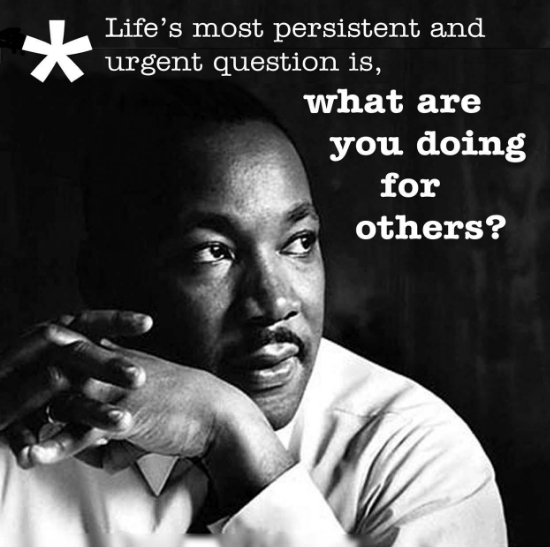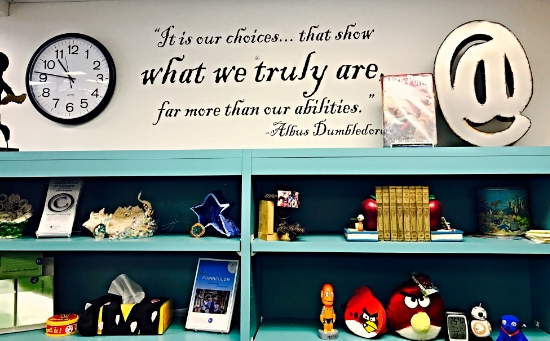Dr. King: a True Servant Leader

I was touched by this timeless Huffington Post article from Mr. James Perry, once mayoral candidate and the the Executive Director of the Greater New Orleans Fair Housing Action Center:
"Among the most important lessons I've learned from Dr. King is the example of servant leadership. A servant leader is one who offers an inclusive vision; listens carefully to others; persuades through reason; and heals divisions while building community.
It is easy to spot servant leaders. In a room where others are jockeying for attention, they are the ones listening to someone others might consider unimportant. When faced with a problem, they look for solutions that benefit everyone. When something goes wrong, they take the blame. When things go well, they share the credit. They tell everyone the same story, even when it is inconvenient or difficult. They know that they don't have all the answers, so they seek advice from others. They work hard and inspire others to do the same.
Martin Luther King, Jr. is an example of a servant leader. His life shows the extraordinary power of servant leadership to radically transform a nation. Our communities and our country need servant leadership more than ever. Deepening economic woes threaten the American dream for far too many working people. Racial divisions are embarrassingly persistent in too many aspects of our economic and social lives. Political despair is battering the uniquely American optimism that has made us a great nation.
There are precious few servant leaders in our current political environment. Many elected officials are more interested in personal power, individual legacy, and financial gain than in the sacrifice and commitment that servant leadership requires."
Powerful words.
As educators, we have the honor to teach the next generation of servant leaders. It is our job, duty, and privilege to instill in them the passion to effect change and the empathy to think outside themselves. To inspire them to think not of the "me" but of the"we."
acknowledge our fails, apologize, and move on. How can we ask them to be accountable and take responsibility if we don't do that, too? I knew a teacher once (now, thankfully retired) who said he would NEVER apologize to a kid or a class even if he was wrong because he would lose "power." I heartily disagree! I think we are seen as more powerful when we say, "Wow, I was wrong about that, I'm so sorry!" Or try the classic "You were right and was wrong" [you can also add a pretend heart attack] to a kid or a class. But do we always remember or take that high road? Nope.
It's OK To Make Mistakes!
I do it all the time!
Case in point. This morning, I was a blockhead and messed up part of our daily #MHTVNews program by forgetting to queue up and show an inspiring video (embedded above) that our Principal Mr. Wilson shared with us last Sunday for today's Friday show. After the show, when he asked me about why it wasn't shown, I drew a blank for a few seconds then I totally threw Mr. Dunbar under the bus ('cause it was his show today & he forgot, too!) I was mortified! Is it just old age? GAH! How did I, or we, forget that!? (See? how humans try to make excuses and push the blame around?)
But Mr. Wilson, was SO kind and understanding, and said we could show it on Tuesday. Whew! Sorry Mr. Wilson! Sorry Mr. Dunbar! It's on me! It was my fault! See? Even when we know it's the right thing to do, or forget, taking responsibility for a gaffe is difficult. Especially with a boss (or a parent!) It's a lifelong struggle to be a good person and do the right thing! But it's SO worth it! Let's share that with our kiddos and admit our occasional (or, in my case, daily) foibles and move on, lesson learned. Again.
Model Charity and Good Works
Our students should also see us as being charitable with our community, helping others, giving of time, effort, or funds to support those that need it. Not in a flashy or "look at me" kind of way, but just to help get things done because it's the right and good thing to do.
Over the years I've seen our students rally to raise funds for the Hurricane Katrina victims, Haiti relief, and yearly for crisis intervention in our community by supporting Grassroots of Howard County. I am SO proud of our kiddos, we've done well...but we can always do better!
This is why I posted the words from page 333 of Harry Potter and the Chamber of Secret on our library wall:
"It is our choices...that show what we truly are, far more than our abilities"
~ Albus Dumbledore
More inspiring words on responsibility:
“Man must cease attributing his problems to his environment, and learn again to exercise his will – his personal responsibility.” ~ Albert Einstein
“It is a painful thing to look at your own trouble and know that you yourself and no one else has made it.” ~ Sophocles
“A sign of wisdom and maturity is when you come to terms with the realization that your decisions cause your rewards and consequences. You are responsible for your life, and your ultimate success depends on the choices you make.” ~ Denis Waitley
from 7 Timeless Thoughts on Taking Responsibility for Your Life
Full disclosure: I've been writing about this since 2010. First, in my old school blog, then my Edublog, then here. Why? Because, it's an ongoing challenge for change, growth, learning, and leadership. I pray every day to be a better person, daughter, teacher, and leader to my kiddos. It....the journey and the challenge, never ends, and that's pretty amazing. Blessings to you all.
Your turn!
What are your thoughts on this topic? Hit me up on the comments to give your challenges, fails, successes, and hopes for the future in teaching, education, and life. (Nothing too big, right?)
Resources:




Comments
Post a Comment